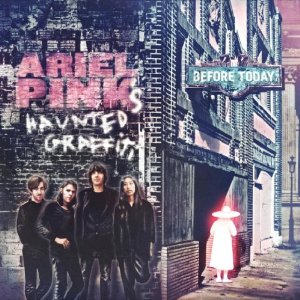As godfather of the chill wave sub-genre which continues to push 70s and 80s FM rock into weird twilight zones of conscious nostalgia, Ariel Pink’s rep as a pusher of guilty pleasures for the terminally abstracted could scarcely be higher right now. The LA musician’s burgeoning profile rests on a series of uber low-key releases picked up by Animal Collective’s Paw Tracks label and reissued to cult acclaim, beginning with The Doldrums in 2004.
The music itself was a lo-fi, at times shockingly indulgent echo of numberless 70s and 80s glossy pop productions, like twisting the dial on a clapped-out wireless and alighting briefly on reel-damaged tracks by Hall & Oates, ELO and Fleetwood Mac among others. But while the influences on Pink’s music are clear enough, pinning down the peculiar alchemy his records set in motion is like hula-hooping with smoke rings – it needs a post-modernist to do it well. There’s something funny about critics tying themselves up into Gordian knots about a hippy-looking dude with an eight-track, of course. But the theories of Jacques Derrida and Slavoj Zizek have been credibly advanced in putting a name to Pink’s prescient M.O., and we’d be remiss not to go into them in some detail here.
Derrida’s concept of ‘hauntology’ was appropriated by writers Simon Price and Mark Fisher to describe music employing an array of aural tics to convey a nostalgic vision that’s siren-like in its seductiveness and every bit as untrustworthy. Central in all this is a sense of decay – conveyed in Pink’s music through pointedly lo-fi production and tape hiss, fragmented sequencing and warped time signatures – that nudges the listener towards an acknowledgement that none of this is real, while still allowing you to enjoy the music at ‘face value’. What Pink gives us, then, is "the reality of the lie", as Zizek puts it in his amusing dissection of The Matrix; a recognition that the images which bombard us in everyday life – visual, textual, aural – can be said not only to shape but in some way constitute our reality.
Whatever Pink’s acquaintance with Baudrillardian notions of hyperreality, the reality itself is almost as strange. Because just as the plaudits start belatedly rolling in for our John The Baptist of glo-fi, he faces his biggest artistic challenge to date in recording a first album ‘proper’ for indie heavyweights 4AD. In the past, studio money has done nothing to add lustre to the stars of eccentric greats like Robert Pollard and Daniel Johnston. How will an artist seemingly so reliant for his current regard on a trick bag of lo-fi recording techniques fare? Pink’s conventional songwriting chops would no doubt put many a ‘straight’ musician to shame, but make no mistake, context is crucial to the man’s oeuvre. How, then, does he cope?
The answer is, by making a really strong record. Before Today reins in some of Pink’s signature tics, finds organic ways to replicate some of the others, and ups the focus of his songwriting considerably – but for all its pleasing strangeness, it’s an album which brings to mind Ben Beaumont-Thomas’ notion that hauntology, "no matter how complex the nostalgia, is still nostalgia, and I can’t help but think we’re lacking a truly innovative strain of new music, one that takes the very fabric of our society – overloaded with digital information and self-empowerment – and renders it in a completely fresh way, just as, say, PiL did in the late ’70s."
But to come briefly to the songs, which really are very good: ‘Hot Body Rub’ kicks off proceedings in moderately twisted fashion, a leering instrumental with funk bass and sax swimming strangely in the mix like furniture down the Alice In Wonderland rabbit hole. ‘Bright Lit Blue Skies’ offers evidence of Pink’s skilled new Haunted Graffiti ensemble, a garage-psych barnstormer in blazing technicolour originally performed by Boston’s obscure Rockin’ Ramrods. The psychedelic theme continues on ‘L’estat’ which sounds like a synth-pop Love, and standout ‘Butt House Blondies’, whose Syd Barrett-esque verses give way to a hair-raising cacophony of Husker Du guitars and what sounds like someone bringing themselves an orgasm in the boot of a car. Disturbing stuff, but arguably not as disturbing as ‘Menopause Man”s lyric "rape me, castrate me, make me gay / lady, I’m a lady today", set to strutting, quizzical pop, which is particularly off-key when it’s rubbing up to such blithely innocuous gems as "so beautiful lady, you make my eyes go boom / and that tells me I need you soon". Words aside, the tricky rhythm section also offers a nice example of how Before Today combats the lack of overlapping textures that made previous work so unpredictable, like those unexpected bits of music that crept into poorly-synched mix tapes. Elsewhere and ‘Fright Night (Nevermore)”s twisted sodium glare and cheaply swooshing drum FX most closely resemble the Pink of old, while ‘Beverly Kills’ sounds like early Prince or even Klaxons having a stab at P-funk and getting it horrifically right.
Perhaps the two most straight-up pop moments here are ‘Round And Round’, whose generous hooks benefit most obviously from the studio environment, and ‘Can’t See My Eyes’, whose mellow synths and superb chorus are given a dreamy, Buckingham-esque production, unusually free of surface clutter. ‘Little Wig’ sounds like Super Furries at their nutty, glam-infused best, with a wicked piano bridge part that sounds like shattering stained glass windows, and closing track ‘Revolution’s A Lie’ just sounds like Joy Division, which is just wildly inappropriate given everything that’s gone before. All this from what they’re already calling his ‘most cohesive’ work to date.
In the end Pink may be remembered as a man whose ideas were ahead of the curve as opposed to a prophet or a wayward genius per se. Before Today confirms all of his considerable talents while revealing him to be human, after all. But it turns out there’s plenty to be said for meeting the wizard behind the curtain.


